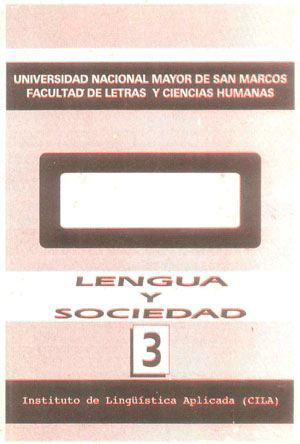The syllabic weight in Shipibo, Tiberian Hebrew and Kashimiri
DOI:
https://doi.org/10.15381/lengsoc.v1i3.26431Keywords:
accent, prosodic categorization, Hebrew, Hebrew Tiberian, Kashmiri, syllabic weight, shipíbo, syllable, moraic theory, optimality theoryAbstract
Many languages categorize their syllables causing them to behave in a special way. One such behavior is accent attraction; thus, for example, in languages such as Latin or Koya, CVC and CVV syllables cause the accent to appear on them, while CV syllables do not exhibit this behavior. Traditionally, this behavior has been viewed as a difference in syllable weight. Those syllables that attract stress have been called heavy syllables; while those that do not, light syllables. But how can we formally account for this categorization? The moraic theory proposes a formal explanation for this behavior by resorting to the mora (µ). Thus, a heavy syllable is bimoraic (=2µ); while a light syllable is monomoraic (=1 µ). In other words, the factor that determines syllable weight is the number of morae or moraic content. Another assumption generally made by this theory is that a syllable is maximally bimoraic.
The present paper aims to present three grammars that support the hypothesis that syllable weight is not only determined by Moraic information or Moraic content as claimed by the Moraic theory, but that non-Moraic structural information is also relevant in some grammars. The cases of Shipibo and Tiberian Hebrew will be reviewed which indicate that their grammars only need the non-Moraic information to categorize syllables. Then, the case of Kashmiri will be examined in detail. This language is of enormous importance as it shows that its grammar needs both Moraic and non-Moraic information, both interacting, in order to categorize its syllables.
Downloads
Published
Issue
Section
License
Copyright (c) 2000 José Alberto Elías Ulloa

This work is licensed under a Creative Commons Attribution 4.0 International License.
AUTHORS RETAIN THEIR RIGHTS
a. Authors retain their trade mark rights and patent, and also on any process or procedure described in the article.
b. Authors can submit to the journal Lengua y Sociedad, papers disseminated as pre-print in repositories. This should be made known in the cover letter.
c. Authors retain their right to share, copy, distribute, perform and publicly communicate their article (eg, to place their article in an institutional repository or publish it in a book), with an acknowledgment of its initial publication in the journal Lengua y Sociedad.
d. Authors retain theirs right to make a subsequent publication of their work, to use the article or any part thereof (eg a compilation of his papers, lecture notes, thesis, or a book), always indicating its initial publication in the journal Lengua y Sociedad (the originator of the work, journal, volume, number and date).



























